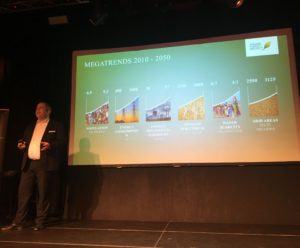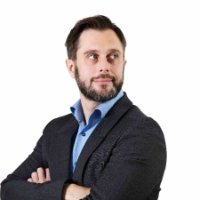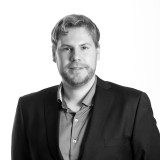Joakim Hauge, the CEO of the Sahara Forest Project, was invited by the Islamic Development Bank (IsDB), United Nations Development Programme (UNDP) and Clean Energy Business Council (CEBC) to speak at a regional conference for Sustainable Energy and Water Conservation in the Middle East.
The conference found place in Jordan on May 9-10.
-My key message to regional stakeholders was to show that a restorative growth for the Middle East is possible, CEO Joakim Hauge said.
The speech on revegetation and creation of green jobs through profitable production of food, freshwater, biofuels and electricity” was well received by the audience.
The conference had participants from international institutions, government agencies and the private sector. Representatives of the energy and water authorities from Arab countries attended the event, such as did representatives from Central Asia.
-I stressed the need for business-cases that are good for the environment, good for people and with long term economic viability. The Sahara Forest Project is aiming for a triple bottom-line when we launch our coming facility in Jordan later this year, Hauge said.
Energy and water on top of the policy agenda
As countries around the world face risks from growing levels of energy and water insecurity, business cases involving more sustainable production are in high demand among executive leaders in business and politics.
This hold special importance for the Arab region – with the world’s highest levels of water insecurity and with countries either being energy-import dependent or net energy exporters but with excessive domestic consumption. Energy and water insecurity has arisen to the top of the policy agenda in most countries in the region, with energy and water challenges a direct risk and contributing factor to broader issues of fiscal space, social vulnerability and economic recovery. But the region is also seeing important opportunities for transformative change, with levels of public and private investment into new green technologies have risen as countries seek to prevent future energy and water bottlenecks to growth and development.
-Leadership when it comes to public policy, technology innovation and scaled-up finance by the private sector is crucial for the region. It was inspiring to be at the conference and discussing with leaders from both the public and private sector, CEO Joakim Hauge said.
The regional conference brought together national partners engaged in sustainable energy and water conservation initiatives. The conference reviewed energy and water trends and scenarios in the region, and local best practices and case studies in the energy efficiency and water conservation experienced through IsDB, CEBC and UNDP projects, best practices in water conservation, and opportunities for scaling-up projects and results.
The conference also explored innovative financial measures, and a roadmap for local institutions to enhance energy and water efficiency results.
-The Sahara Forest Project finds it important to engage and share our knowledge at larger conferences like this conference in Jordan. It is important to have a dialogue with regional stakeholder, reviewing current trends in public-private partnerships in the region, and be a part of the innovation debate when it comes to rethinking current production systems for water, energy and food, CEO Joakim Hauge concluded.

 nal strategy consulting and co-founding several commercial and philanthropic ventures. He holds an Executive Education degree in Corporate Finance from the Stockholm School of Economics, a Master of Science and Bachelor of Science in Strategy and Marketing from BI, Norwegian Business School and a bachelor’s degree in psychology from the University of Oslo.
nal strategy consulting and co-founding several commercial and philanthropic ventures. He holds an Executive Education degree in Corporate Finance from the Stockholm School of Economics, a Master of Science and Bachelor of Science in Strategy and Marketing from BI, Norwegian Business School and a bachelor’s degree in psychology from the University of Oslo.




 Mr. Pål Dale is elected as a new member to the Board of Directors of Sahara Forest Project AS.
Mr. Pål Dale is elected as a new member to the Board of Directors of Sahara Forest Project AS.